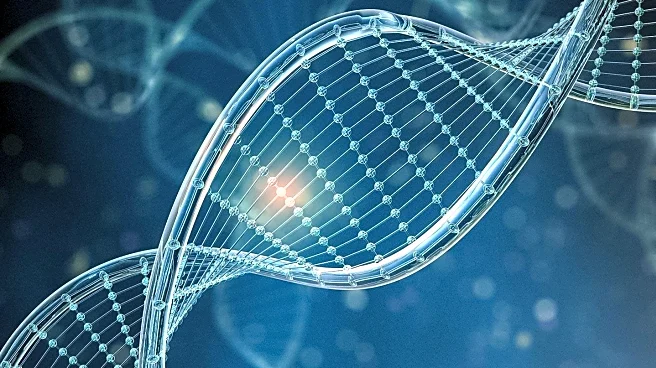What is the story about?
What's Happening?
Researchers at the University of Tokyo have identified giant DNA elements, termed Inocles, within the human oral microbiome. These extrachromosomal DNA elements, previously undetected, are believed to play a significant role in bacterial adaptation to the dynamic environment of the mouth. The discovery was made using advanced long-read sequencing techniques, which allowed the researchers to assemble complete Inocle genomes. These genomes are hosted by the bacteria Streptococcus salivarius and are among the largest extrachromosomal genetic elements found in the human microbiome. The study, published in Nature Communications, suggests that Inocles may contribute to various functions, including resistance to oxidative stress and DNA damage repair. The researchers aim to further explore the functions of Inocles and their potential impact on oral health conditions such as cavities and gum disease.
Why It's Important?
The discovery of Inocles in the oral microbiome could have significant implications for health and disease research. Understanding the role of these giant DNA elements may provide insights into how oral bacteria colonize and persist, potentially influencing oral health and immunity. The presence of Inocles in a large portion of the human population suggests they could be markers for serious diseases, including cancer. This research highlights the importance of the oral microbiome in human health and opens new avenues for studying the interactions between humans and their resident microbes. The findings could lead to advancements in microbiome research and the development of new strategies for managing oral health and preventing disease.
What's Next?
The research team plans to develop stable methods for culturing bacteria containing Inocles to investigate their functions further. They will explore whether Inocles can spread between individuals and how they might influence oral health conditions. Additionally, researchers will use laboratory experiments and computational simulations to predict and model the roles Inocles may play. This ongoing research could lead to new insights into the relationship between the oral microbiome and human health, potentially identifying Inocles as markers for diseases like cancer.
Beyond the Headlines
The discovery of Inocles underscores the complexity of the human microbiome and the potential for previously unknown elements to impact health. This research may prompt a reevaluation of the oral microbiome's role in disease prevention and management. The ethical implications of manipulating microbiomes for health benefits could also be explored, as understanding these interactions may lead to new therapeutic approaches. The study highlights the importance of technological advancements in uncovering hidden aspects of human biology and their potential impact on health.
















